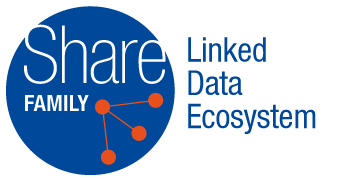Working together, we can enhance catalogues, improve the visibility of collections and provide a better user experience for patrons.
Libraries, archives and museums hold a vast quantity of data and resources that, until now, have often remained hidden from sight in catalogues and archives. By implementing the BIBFRAME data model and facilitating the interoperability with IFLA LRM and other widely used ontologies, bibliographic information can be transformed into Linked Data, revealing it to a wider audience and encouraging greater engagement with library, archive and museum collections.
Linking bibliographic data and resources from a network of libraries, archives and museums increases the dissemination and discoverability of knowledge and allows patrons to search in a range of catalogues at once.
Check out our presentation video and learn more about the Share Family mission on Youtube: COOPERATION, SUSTAINABILITY, OPENNESS, INCLUSIVITY, DYNAMISM.
